8 Yoga Poses To Do Post Dinner For A Good Night’s Sleep
Stretch and flex your muscles to relieve tension and prepare for a restful night.
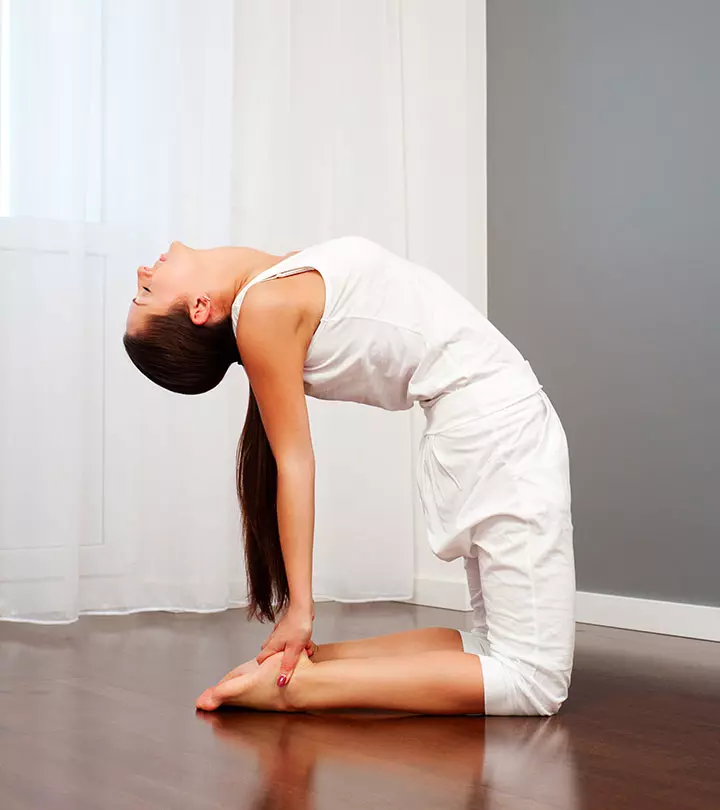
Image: Shutterstock
If you have a hard time sleeping after dinner, don’t worry. We have got you covered. You can perform certain yoga poses after dinner that may help you get a good night’s sleep.
You may have difficulty getting quality sleep when you have unhealthy and premature eating habits. However, there are a few excellent yoga postures you can do after supper to ensure your sleep patterns are not disrupted, and they can also help with digestive issues.
Keep reading to know more!
In This Article
Benefits Of Practicing Yoga After Dinner
Here are some benefits of sticking to a daily yoga routine after eating dinner:
- Aids Digestion: Gentle yoga may help stimulate digestion and reduce bloating. It may also aid weight management.
- Promotes Relaxation: It helps calm your mind and body, making it easier to unwind before bedtime.
- Improves Sleep Quality: Practicing yoga may lead to better sleep by reducing stress and anxiety.
- Enhances Flexibility: Regular stretching may improve overall flexibility and balance and relieve muscle tension.
- Boosts Mood: Yoga encourages mindfulness and enhances your mood, promoting a sense of well-being.
Now that you know about their benefits, you must be wondering which yoga poses should you try? Find that out in the next section.
Key Takeaways
- Practicing yoga after dinner may improve digestion and reduce bloating and constipation.
- Adho Mukha Svanasana, Uttanasana, Ustrasana, Dhanurasana, and Balasana are effective poses to try.
- Pawanmukt asana helps rid the body of bloating.
- Savasana helps recover lost energy and revitalize the body.
- Pregnant women and people with knee injuries should avoid Balasana.
Effective Yoga Poses To Do After Dinner
Adding these yoga poses to your evening routine may effectively reduce the discomfort caused by heavy meals. By gently stretching and moving your body, you can encourage digestion, reduce bloating, and promote a sense of lightness.
1. Downward Dog Pose (Adho Mukha Svanasana)
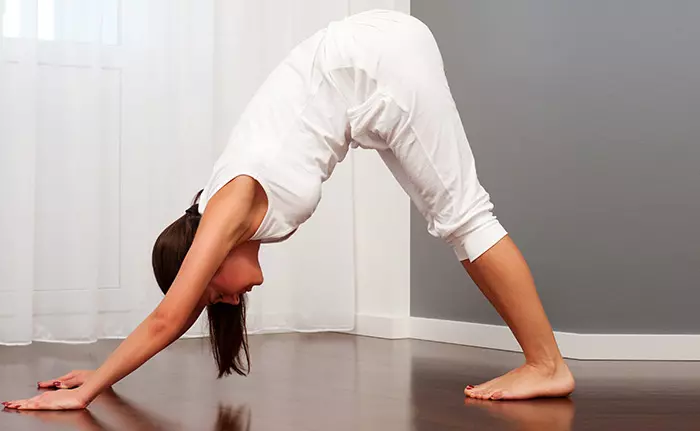
This is one of the most popular yoga poses. This pose can be performed at any time of the day. However, this pose helps better bowel movement and affects the abdomen. Performing this asana is easy. Place your palms a little over shoulder-width apart. Keeping your toes tucked in; proceed to raise your hips. Your chest should move back along with the thighs. The knees should be bent. Remember that the hips should be high; keeping the sole grounded isn’t as important. Hold the position for around 10-15 seconds. Repeat (1).
Caution: Avoid this pose if you have wrist or shoulder injuries, as it may put some strain on those areas.
2. Standing Forward Bend Pose (Uttanasana)
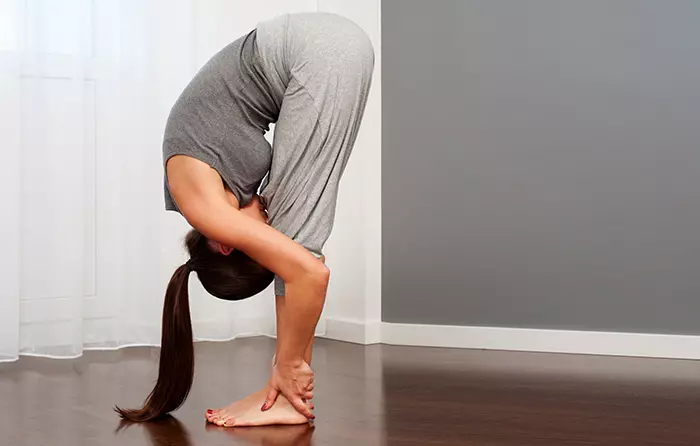
The uttanasana, or the standing forward bending pose, is good for the gastrointestinal tract. It helps push food along the tract and helps relieve constipation or the bloated feeling. To perform this asana, keep your knees bent and try to reach over your stomach and grasp the back of both knees. Ideally, you should feel tension in your hamstrings. If you don’t experience any tension, consider straightening your legs. Hold this pose for about 15-20 seconds. Repeat (2).
Caution: If you have back issues, be gentle and don’t force the stretch. Move only how much you are comfortable with.
3. Camel Pose (Ustrasana)
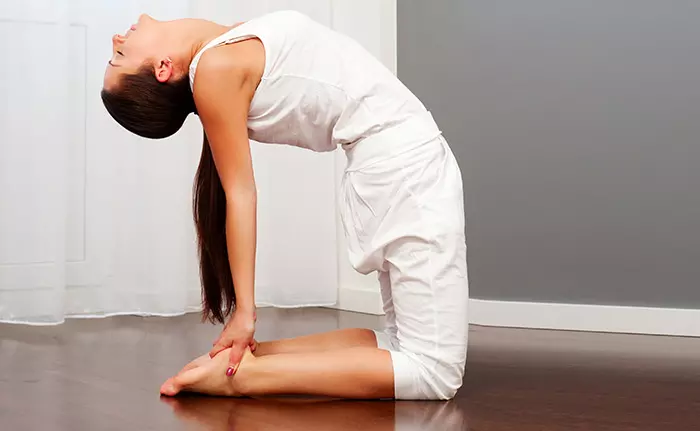
The camel pose is an effective pose of yoga for digestion after eating, and is also a great exercise for the back. It appears to be difficult to do, and it has been rumored to adversely affect the back. However, studies have proved that Ustrasana not only strengthens the back muscles, but also eases stomach problems and aids digestion (3).
Caution: If you have lower back pain, consult a healthcare provider before attempting this pose.
4. Bow Pose (Dhanurasana)
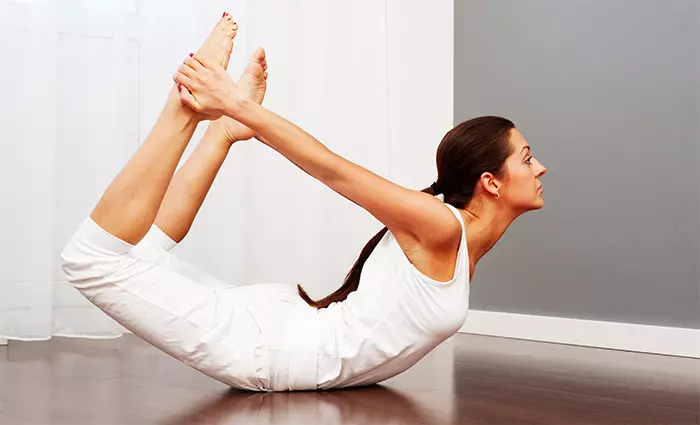
The Dhanurasana, or the bow pose, is another asana that is good for relieving constipation and easing a bloated stomach. It has also been proved to help tone the back, the abdomen and contribute to body flexibility. It is a bit tricky to perform and doesn’t appear all that comfortable. Indulge in gentle movements and once you get to the final position, hold the pose for 15-20 seconds before release (4).
Caution: Avoid this pose if you have any back injuries, as it can strain the spine.
5. Child’s Pose (Balasana)
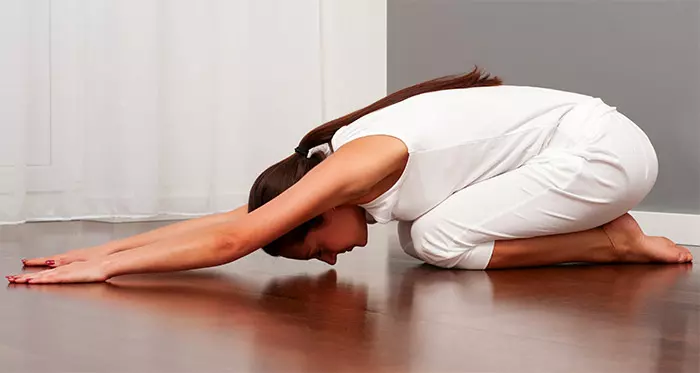
Balasana, or the child’s pose, is another asana that is designed to help clear a bloated stomach and ease indigestion, some of the impressive benefits of balasana. It is one of the most effective yoga asanas after dinner. To perform balasana, begin from a kneeling position and tuck your chest into your thighs and keep the forehead on the ground. Keep your arms straight at the body’s side. Take a few slow, full breaths. Hold this pose for around 10-15 seconds. Repeat (5).
Caution: If you have a history of neck or back injuries, be mindful of your head and neck position to avoid strain. Consider placing a cushion or pillow under your forehead for extra support.
 Quick Tip
Quick Tip6. Wind Releasing Pose/Wind Removing Pose/Wind Liberating Pose (Pawanmuktasana)
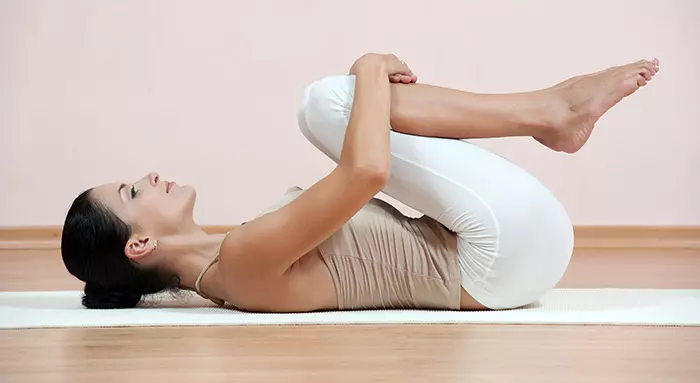
This pose is designed to help rid you of bloating by making you break the wind. Thus, you must be performing this pose all alone. To perform, roll onto your back, inhale and hold your right knee against your chest. Begin rocking the knee side-to-side to massage your abdominal organs. Take a few deep breaths and switch legs and begin rocking the right knee (6).
Caution: Avoid this pose if you have any abdominal injuries or conditions, such as hernias, as it can put pressure on the abdominal area. Always consult a healthcare provider if you have concerns before practicing this pose.
7. Reclining Goddess Pose (Supta Baddha Konasana)
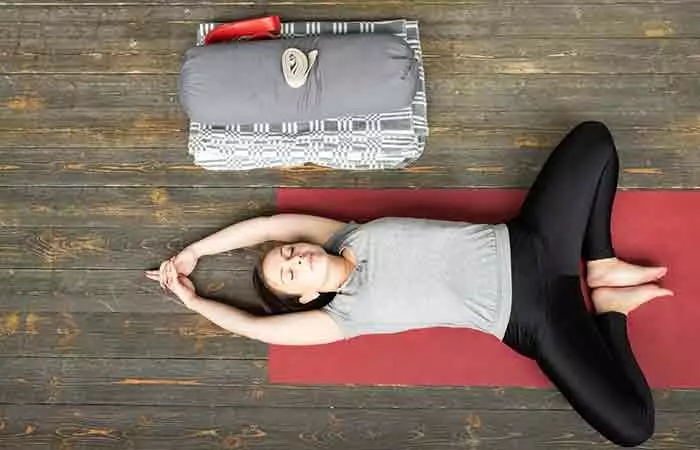
This pose is also called the reclining bound angle pose and is a great exercise for digestive comfort post-dinner. Lie on your back (you can place a pillow or block under your upper back for support), with your knees bent and open outward so the soles of your feet touch each other, similar to the butterfly pose. This gentle reclining asana is said to stimulate the abdominal muscles and organs, encouraging healthy digestion. Get into this position and adjust yourself according to your flexibility to ensure you are comfortable. Let your hands rest on either side of your body or stretch them behind your head. Take deep breaths and hold the pose for about 5 minutes and release.
Caution: If you have hip or knee issues, adjust your position for comfort to avoid strain.
8. Corpse Pose (Savasana)
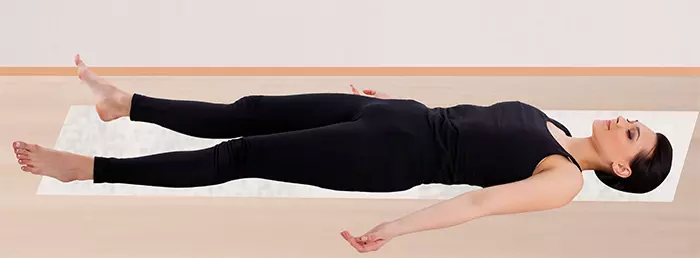
The lazy person’s favorite pose and a great yoga pose for relaxation, the savasana, is designed to help you improve body processes. It helps you get revitalized by helping you recover all the energy you lost performing all these asanas listed above. Getting into position is simple. Lie on your back, keep your hands by your sides, with your palms facing the sky and close your eyes. Hold position for 15-20 minutes. Keeping your eyes closed; concentrate on your breathing pattern. This pose is often substituted by the Padmasana (seated pose) for meditation. Usually, you should end your yoga with this pose (7).
Caution: If you have difficulty lying flat on your back due to back pain or discomfort, consider using a bolster or pillow for support.
 Fun Fact
Fun FactThe word “Savasana” stems from the Sanskrit words “Sava,” meaning corpse, and “Asana,” meaning posture.
Do you have a habit of performing Yoga after dinner for digestion? Remember to share any other poses that you feel are good for digestion. Leave a comment below.
Infographic: 3 Easiest Yoga Poses To Do After Dinner To Promote Sleep And Digestion
There is a common notion that yoga cannot be practiced after a meal. There is also another common notion that yoga is difficult and takes months, if not years, of practice to get right. To debunk both of these ideas, here are three extremely easy yoga poses that can be your post-meal exercises and that anyone can do properly after dinner to improve their digestion and sleep better.
Some thing wrong with infographic shortcode. please verify shortcode syntaxYoga has always been a beneficial source for practicing mindfulness and aiding in stress reduction. Doing a few yoga poses after dinner is the right way to ease discomfort and slip into a blissful sleep. The asanas listed above help improve your bowel movements, promote restoration of regular functioning, enhance gastrointestinal health, reduce bloating, ease constipation, promote digestion, resolve stomach issues, improve flexibility, and revitalize your body. Moreover, these poses are easy to perform and highly effective. So, if you are having trouble with digestion and are unable to get a good night’s sleep, try these calming poses, some stretching, and some gentle breathing exercises post-dinner and see the results for yourself. The most important aspect of enjoying yoga after dinner is to pay attention to how your body feels. Listen to your body and make adjustments as needed for a comfortable and fulfilling experience.
Frequently Asked Questions
Can we do Vajrasana after dinner?
Yes. Vajrasana can be done after dinner as it helps boost digestion (8).
Can we do planks after dinner?
No. Since planks focus on the abdominal region and put pressure on your stomach, it is not ideal to do it after dinner.
Can we do viparita karani after dinner?
No. Doing viparita karani after dinner is not ideal as it involves positioning your legs upwards and may cause discomfort.
Bloating and improper digestion are quite common. But a simple, 10-minute yoga routine with the right poses can aid better digestion and reduce bloating. Follow the routine mentioned in the video below, and you will feel better in no time!
Read full bio of Sri Yogi Anand
Read full bio of Shirin Mehdi
Read full bio of Ravi Teja Tadimalla
Read full bio of Himanshi Mahajan








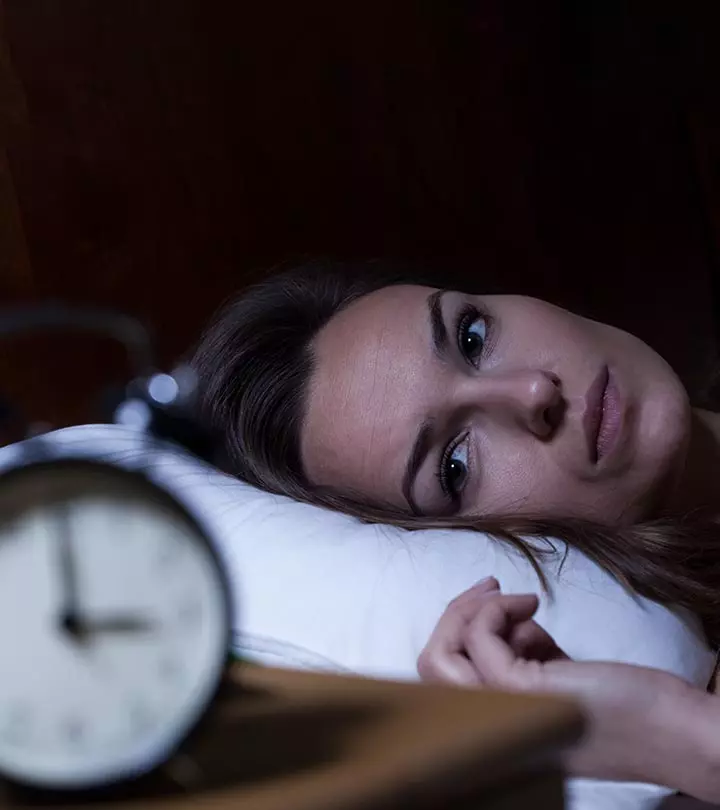

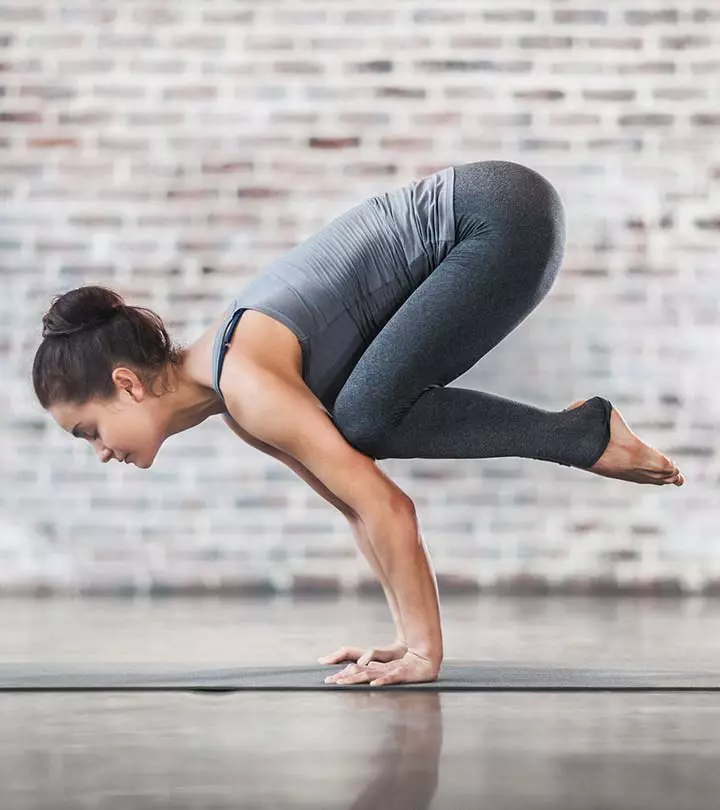
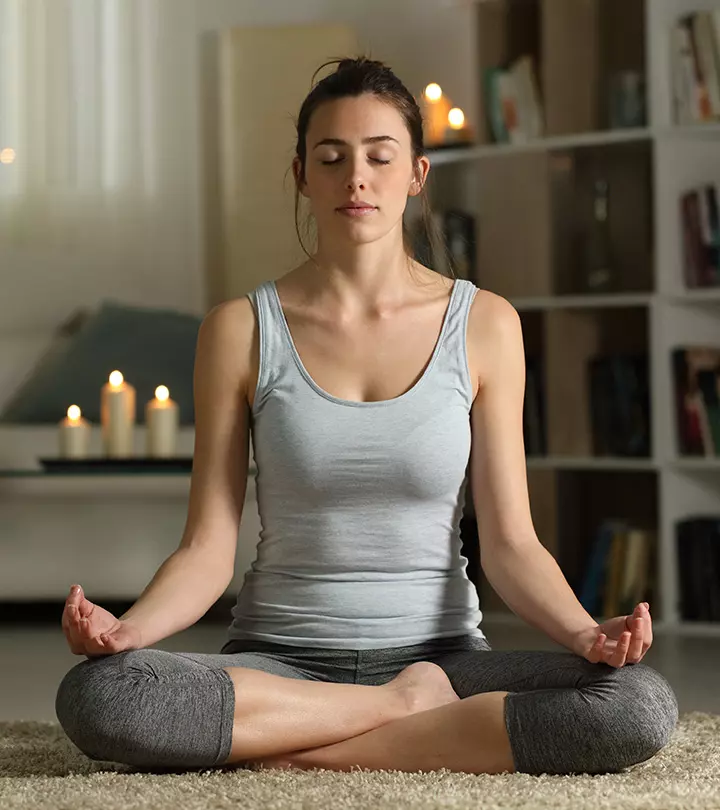
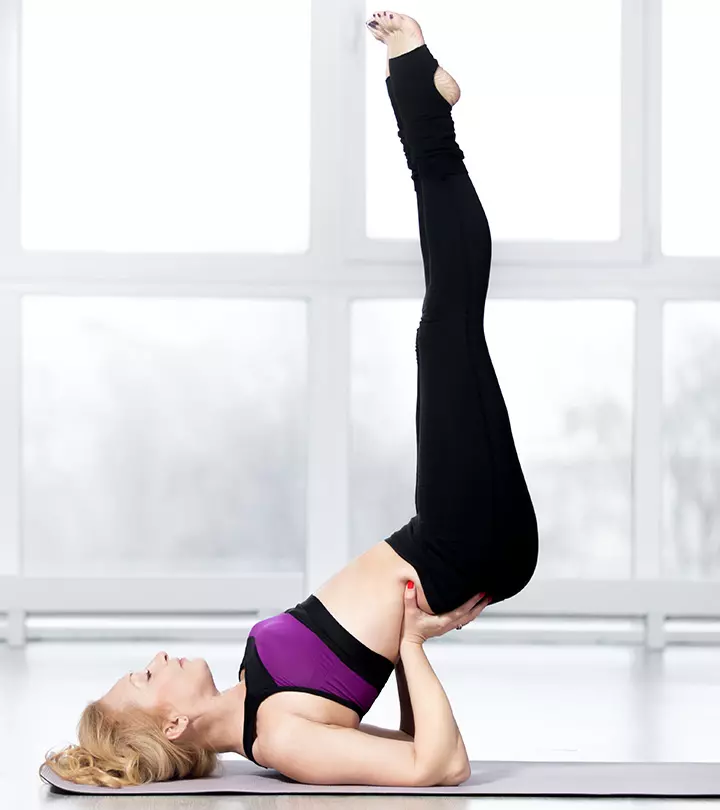


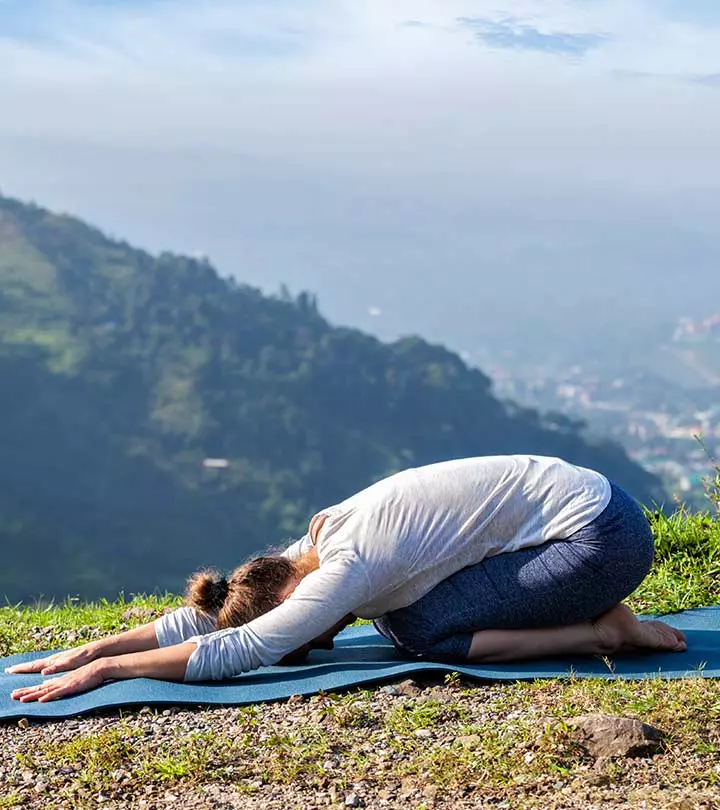
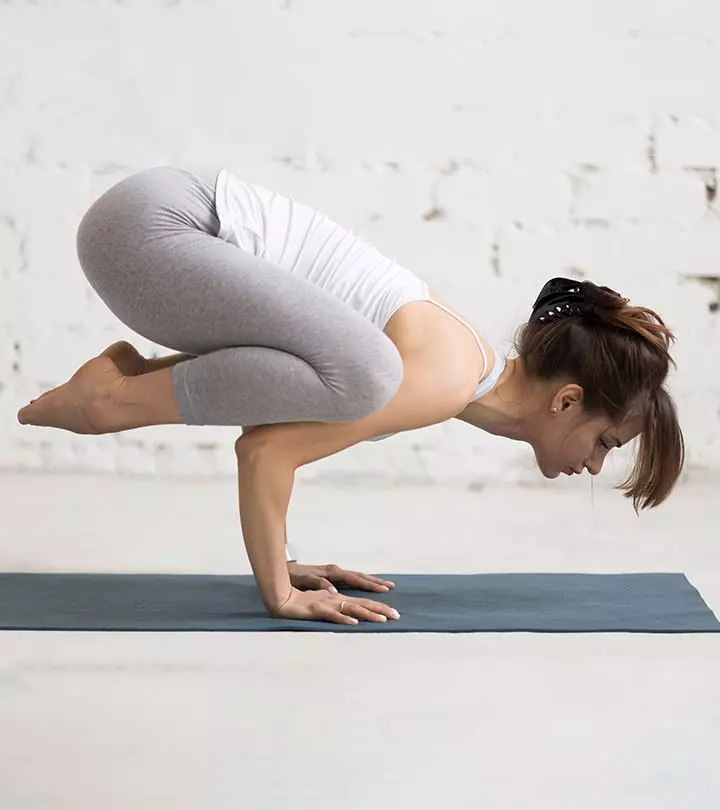




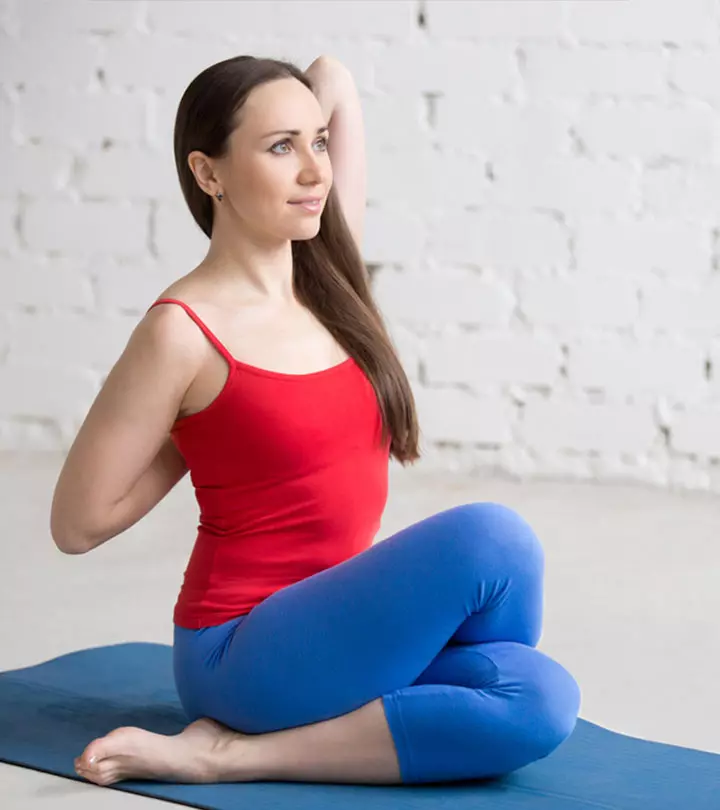
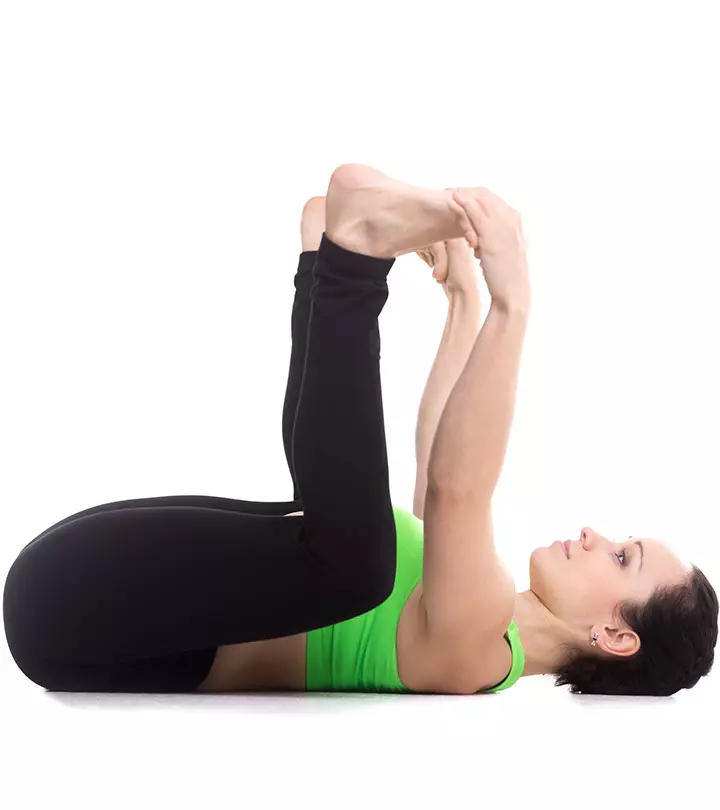




Community Experiences
Join the conversation and become a part of our empowering community! Share your stories, experiences, and insights to connect with other beauty, lifestyle, and health enthusiasts.